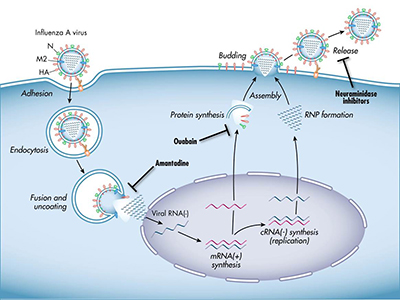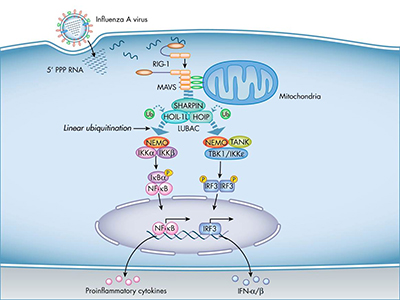Pathophysiology of Acute Lung Injury: Role of LUBAC and Na,K-ATPase in Acute Lung Injury
 Patients with acute lung injury and Acute Respiratory Distress Syndrome (ARDS) have impaired gas exchange due to altered alveolar epithelial function which results in accumulation of edema fluid leading to hypoxia. Alveolar hypoxia is common in patients with ARDS and contributes to alveolar epithelial dysfunction. Seasonal influenza infection affects a significant proportion of the population in the US and worldwide and while most patients infected with influenza A recover without sequelae, in many patients influenza virus infection may cause ARDS. Alveolar epithelial cells are targets for influenza virus A, and play an important role in mounting the initial host response. Upon influenza A virus infection, alveolar epithelial cells release cytokines that contribute to the recruitment of monocytes and macrophages to the site of infection and also participate in viral clearance which may limit the infection spreading. However, the underlying mechanisms of these events are poorly understood. We hypothesize that the alveolar epithelium plays an important effector role in protecting the lung from severe injury. In studies pertaining to this grant we seek to elucidate the mechanisms that lead to the stabilization of Na,K-ATPase plasma membrane levels during hypoxia as an adaptation to stress thus promoting cell survival.
Patients with acute lung injury and Acute Respiratory Distress Syndrome (ARDS) have impaired gas exchange due to altered alveolar epithelial function which results in accumulation of edema fluid leading to hypoxia. Alveolar hypoxia is common in patients with ARDS and contributes to alveolar epithelial dysfunction. Seasonal influenza infection affects a significant proportion of the population in the US and worldwide and while most patients infected with influenza A recover without sequelae, in many patients influenza virus infection may cause ARDS. Alveolar epithelial cells are targets for influenza virus A, and play an important role in mounting the initial host response. Upon influenza A virus infection, alveolar epithelial cells release cytokines that contribute to the recruitment of monocytes and macrophages to the site of infection and also participate in viral clearance which may limit the infection spreading. However, the underlying mechanisms of these events are poorly understood. We hypothesize that the alveolar epithelium plays an important effector role in protecting the lung from severe injury. In studies pertaining to this grant we seek to elucidate the mechanisms that lead to the stabilization of Na,K-ATPase plasma membrane levels during hypoxia as an adaptation to stress thus promoting cell survival.  We have found that the degradation of PKCζ, which triggers the down-regulation of Na,K-ATPase, by the E3 ligase HOIL-1L decreases alveolar epithelial cell death and will study whether this results in lung injury during chronic hypoxia. HOIL-1L is a member of the Linear Ubiquitination Assembly Complex (LUBAC) and we are studying whether LUBAC participates in the modulation of the inflammatory intensity in the lung epithelium during influenza virus infection. Also, we are investigating the mechanisms by which increased intracellular sodium concentration which occurs during modest inhibition of the Na,K-ATPase, prevents viral replication and whether pharmacologic inhibition of the Na,K-ATPase by cardiotonic steroids such as ouabain and digoxin are protective by inhibiting virus replication. Understanding the mechanism(s) that lead to alveolar epithelial dysfunction during influenza virus infection will provide novel information which is of clinical relevance and has the potential for innovative approaches in the treatment of patients with ARDS.
We have found that the degradation of PKCζ, which triggers the down-regulation of Na,K-ATPase, by the E3 ligase HOIL-1L decreases alveolar epithelial cell death and will study whether this results in lung injury during chronic hypoxia. HOIL-1L is a member of the Linear Ubiquitination Assembly Complex (LUBAC) and we are studying whether LUBAC participates in the modulation of the inflammatory intensity in the lung epithelium during influenza virus infection. Also, we are investigating the mechanisms by which increased intracellular sodium concentration which occurs during modest inhibition of the Na,K-ATPase, prevents viral replication and whether pharmacologic inhibition of the Na,K-ATPase by cardiotonic steroids such as ouabain and digoxin are protective by inhibiting virus replication. Understanding the mechanism(s) that lead to alveolar epithelial dysfunction during influenza virus infection will provide novel information which is of clinical relevance and has the potential for innovative approaches in the treatment of patients with ARDS.